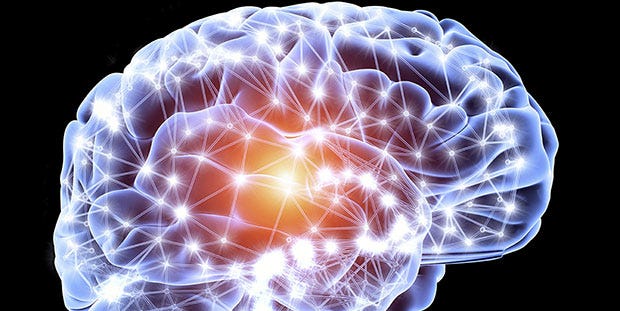A small study found that intercepting brain signals could limit urges for binge eating for those who struggle with binge eating disorder.Two women who agreed to undergo the implant process saw results and no longer felt urges to binge. Experts weigh in on this experimental treatment and what it means for people with disordered eating.
An implant in your brain might sound science-fiction, but a new study suggests that it may reduce the urge for binge eating, in those with the disorder.
Researchers asked the question: what if an uncontrollable urge to rapidly eat large amounts of food is stemmed from an impaired brain circuit? If that were the case, people who live with binge eating disorder—a psychiatric diagnosis—might be no more at fault for overeating than a patient with Parkinson’s disease is for their tremors.
Deep brain stimulation, or DBS, is a method routinely used to suppress tremors in patients with Parkinson’s. In DBS, “electrodes are implanted into the brain in centers that might not be working as well as we would like,” explains Amit Sachdev, M.D., medical director for neurology at Michigan State University. The brain uses small electrical impulses to communicate, and the battery pack and electrodes help to stimulate areas, he adds. For the binge eating treatment, the device only stimulates neurons when the device detects a signal to start a binge.
The small study, published earlier this year in the journal Nature Medicine, involves two women and will be expanded in a few months to include four more people living with binge eating disorder who regained the weight they lost after bariatric surgery.
Both women who participated in this study had previously undergone bariatric surgery in an effort to reduce their weight, but for both women, the weight they lost after the surgery had been regained due to uncontrollable urges associated with binge eating disorder. Binging in general is to be exposed to something in a large quantity over a short period of time, says Dr. Sachdev. “There are reward centers that can be triggered by eating.”
As part of the study, the researchers provided each woman with a 5,000-calorie buffet of their favorite foods when they were not hungry. The researchers recorded electrical impulses in the women’s reward centers in their brains as they ate, and determined that neurons were firing just before the binge and that those electrical impulses were correlated with the participants’ feeling a loss of control. After making this connection, the researchers predicted that a direct brain stimulator might be able to intercept the signals associated with loss of control, and prevent the women from feeling urges to binge.
After connecting the devices into the women’s brains, the investigators told the participants that devices would be activated at some time during the next couple of months, but would not tell them when. Both women said that once the devices were activated, they knew immediately, because they no longer felt uncontrollable urges to binge. Now both women are seeing their weight slowly, but consistently dropping. Both say that without actively thinking about it, they are eating differently.
The two women who decided to undergo this experimental treatment for their eating disorders were implanted with the device a year ago, and will be followed for up to three years. These women had the option to have their devices removed after 12 months, but both of them chose to continue using them because they no longer experienced the compulsive urges to binge eat.
The bottom line
While this very experimental treatment is showing results as of now, this treatment won’t be regularly offered to those struggling with binge eating disorder anytime soon. Before the treatment can be approved by the Food and Drug Administration, researchers will need to rigorously test the method in at least 100 people in multiple medical centers, which is expected to take several years to complete.
“Neurosurgery is always a last resort,” says Dr. Sachdev. People struggling with disordered eating should be encouraged that a spectrum of treatments are being considered. “These days, there are many safe options to pursue care for many neurologic diseases…This study suggests surgery could be an option for binge eating, but it is not likely to be the right answer for large numbers of people,” he explains.
When it comes to future neurological conditions being treated with these implanted electrodes, deep brain stimulation is already a very well regarding treatment for Parkinson’s disease, says Dr. Sachdev. “There is no doubt more indications will become available.”
Related Stories
Source link

